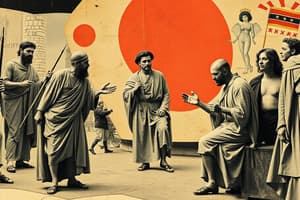Podcast
Questions and Answers
What do drama masks represent?
What do drama masks represent?
The dividing of theatre into genres.
What does the term 'genre' refer to in theatre?
What does the term 'genre' refer to in theatre?
A category or type of play.
What are the six main genres of theatre?
What are the six main genres of theatre?
- Tragicomedy (correct)
- Romantic Drama
- Comedy (correct)
- Heroic Drama (correct)
- Domestic Drama (correct)
- Tragedy (correct)
- Melodrama (correct)
Define tragedy in theatre.
Define tragedy in theatre.
What are the two basic types of tragedy?
What are the two basic types of tragedy?
When does modern tragedy begin?
When does modern tragedy begin?
What distinguishes traditional tragedy?
What distinguishes traditional tragedy?
What are some characteristics of traditional tragedy?
What are some characteristics of traditional tragedy?
What defines comedy in plays?
What defines comedy in plays?
What are some characteristics of comedy?
What are some characteristics of comedy?
What is slapstick?
What is slapstick?
What are the six forms of comedy?
What are the six forms of comedy?
What is heroic drama?
What is heroic drama?
What is tragicomedy?
What is tragicomedy?
What does the Theatre of the Absurd express?
What does the Theatre of the Absurd express?
Flashcards are hidden until you start studying
Study Notes
Theatre Genres Overview
- Drama masks symbolize the division of theatre into distinct genres, representing the art form's complexities.
- A genre is defined as a specific category or type of play within the theatrical landscape.
Main Genres of Theatre
- Six primary genres include:
- Comedy
- Tragedy
- Tragicomedy
- Melodrama
- Domestic Drama
- Heroic Drama
Details on Tragedy
- Tragedy is a serious dramatic form, often concluding with unhappy or catastrophic endings.
- It represents one of the highest forms of theatrical art, reflecting profound themes.
Types of Tragedy
- Two basic categories:
- Modern Tragedy: Emerged from the late 19th century, lacks royalty as central characters, typically written in prose, emphasizes human emotional depth.
- Traditional Tragedy: Features noble heroes facing tragic destinies, expressed through verse, often highlights acceptance of fate.
Characteristics of Traditional Tragedy
- Tragic heroes and heroines embody noble qualities facing inevitable downfall.
- Acceptance of responsibility is a central theme.
- The form often utilizes tragic verse to convey the emotional weight of the narrative.
- The impact of tragedy is notable, stirring both pessimism and affirmation within the audience.
Comedy Defined
- Comedy is characterized by a lighthearted tone, focusing on less serious themes intended to amuse, culminating in a happy ending.
Key Characteristics of Comedy
- Suspends the natural laws of reality.
- Highlights contrasts between individuals and societal norms.
- Contains a comic premise as its foundational idea.
Types of Comedy
- Six notable forms include:
- Farce
- Burlesque
- Satire
- Domestic Comedy
- Comedy of Manners
- Comedy of Ideas
Other Theatrical Forms
- Heroic Drama often concludes on a positive note, where characters either find happiness or the hero sacrifices for a greater cause.
- Tragicomedy blends elements of tragedy and comedy, influencing genres like the Theatre of the Absurd.
- The Theatre of the Absurd reflects the playwright’s perspectives on the absurdity of the human experience, exemplified in works like "Waiting for Godot."
Studying That Suits You
Use AI to generate personalized quizzes and flashcards to suit your learning preferences.




